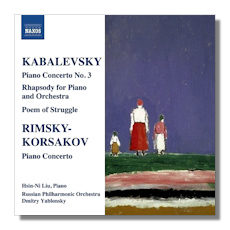
The Internet's Premier Classical Music Source
Related Links
-
Kabalevsky Reviews
Rimsky-Korsakoff Reviews - Latest Reviews
- More Reviews
-
By Composer
-
Collections
DVD & Blu-ray
Books
Concert Reviews
Articles/Interviews
Software
Audio
Search Amazon
Recommended Links
Site News
 CD Review
CD Review
Russian Piano Concertos

- Dmitry Borisovich Kabalevsky:
- Piano Concerto #3 in D Major, Op. 50 1
- Rhapsody on the Theme "School Days", Op. 75 1
- Poem of Struggle 2
- Nikolai Rimsky-Korsakoff: Piano Concerto in C Sharp minor, Op. 30 1
1 Hsin-Ni Liu, piano
2 Gnesin Academy Chorus
Russian Philharmonic Orchestra/Dmitry Yablonsky
Naxos 8.557794 DDD 54:09
This is an odd program of works. Rimsky-Korsakov's old school concerto, which feels very much like "art for art's sake," is inserted between Kabalevsky's two concertante works, which are practically valentines to the Soviet Communist party. The CD ends with Poem of Struggle, an undistinguished work for chorus and orchestra whose text references the October Revolution, and which seems to suggest that the Soviet Union would be only to glad to export its brand of Communism to other countries as well. Um, no thanks.
Actually, Kabalevsky's Third Piano Concerto "Dedicated to Soviet Youth" and Rimsky-Korsakov's sole work in this genre have this much in common: they are short and very enjoyable. The former might have been intended for Soviet youth – in fact, the 1953 première went to Vladimir Ashkenazy, who indeed was a teenager at the time – but it is not lacking in sophistication. Admirers of Shostakovich's two piano concertos probably will enjoy this work, though it doesn't have the bite and inventiveness of Shostakovich's First Piano Concerto. Rimsky-Korsakov's concerto was premièred in 1884, and at the time it was described as a "symphonic poem on folk themes with the use of piano." It requires less than a quarter-hour to play, is well-written for the piano, and deserves to be played and recorded more frequently.
Kabalevsky's School Days Rhapsody (1964) is dedicated to the "young musicians of the Volga region." The theme is Kabalevsky's own, and the work is essentially a breezy set of variations – something that Prokofieff might have written in his sleep. Music written for competitions often is more functional than inspired, and that's pretty much my verdict about this piece. It is, however, barely twelve minutes long, and it is over before it truly wears out its welcome.
The closing Poem for Struggle, despite its revolutionary theme, might have been composed with Max Steiner standing over Kabalevsky's shoulder. (Steiner is better, though.) Composed in 1930, when the composer still was in his twenties, perhaps he came to regret it before he died in 1987!
Pianist Hsin-Ni Liu was born in Taipei and was educated primarily in the United States. Her performances of these three largely uncomplicated – emotionally and technically – works are definitely capable. Kathryn Stott (on Chandos) sparkles more in the Third Piano Concerto, though. The Gnesin Academy Chorus does what it must in the Poem of Struggle, and not without refinement. Yablonsky leads the Russian Philharmonic Orchestra in readings that do the music justice, even though they can't convince me that all of it is first-class. The engineering is excellent.
Copyright © 2009, Raymond Tuttle




















